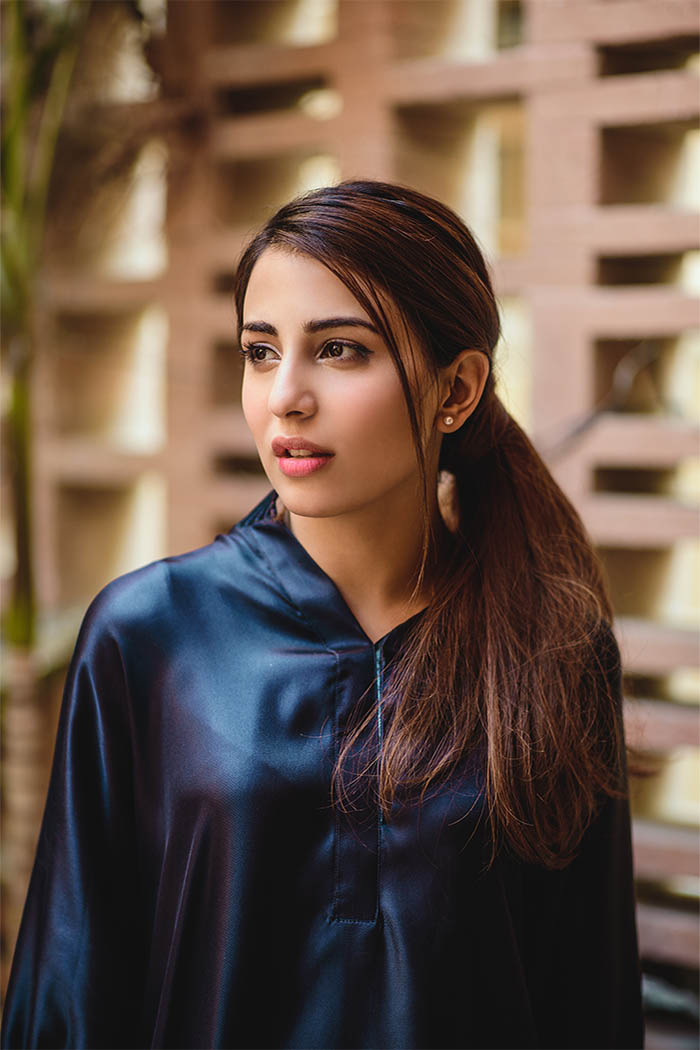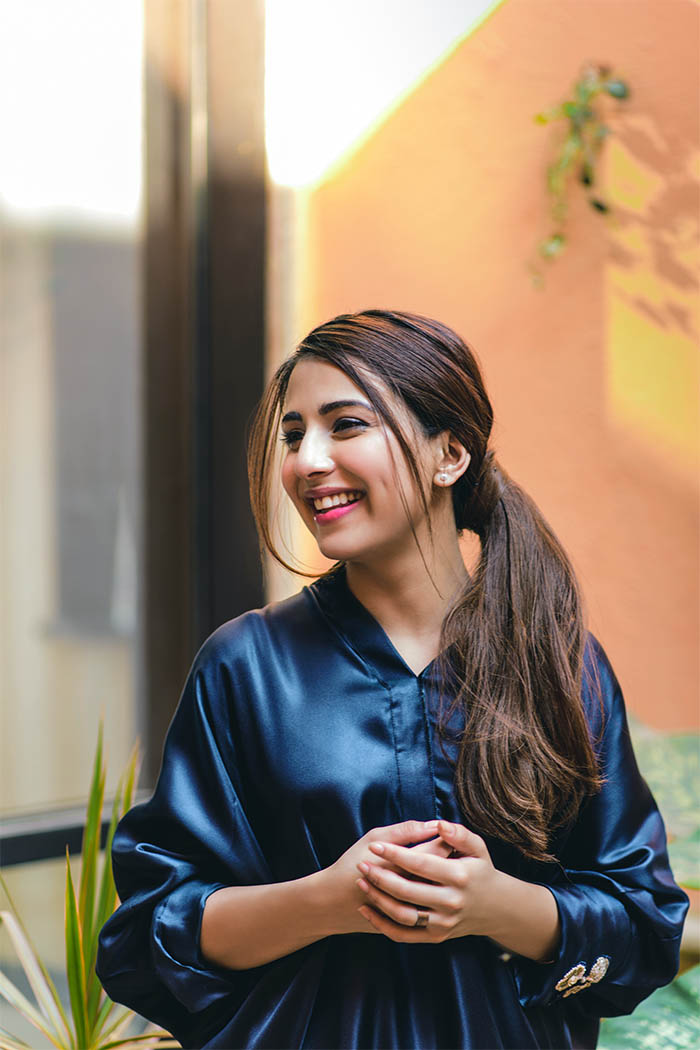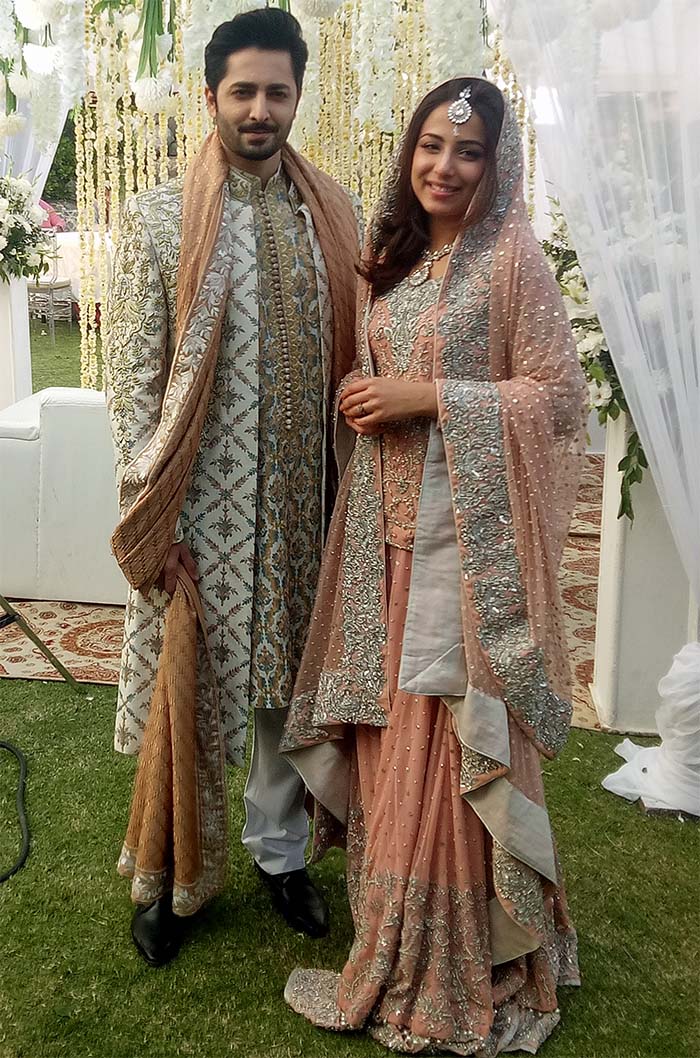In an exclusive interview spunky and very good-looking Ushna Shah talking about women’s rights, animal welfare, the culture of show business, acting, her current projects, and her plans for the year.
You promoted the International Women’s Day march for women’s rights very vigorously. Why was it important for women to join the march?
It was very important for women to join the march because protest, remonstration and defiance are powerful tools in the fight for women’s rights. Things do not change for the better on their own. Blood, sweat, tears and toil are needed to bring about change. Women fought with remarkable grit and strength, to secure rights for themselves in the past. The rights to live free from violence, subjugation and discrimination, to bodily integrity and autonomy, to vote, to get education, to work, to own property, to equal citizenship, and, even to drive were not handed to women on a platter; they had to fight for them. And, it was not an easy fight.
The rights that women enjoy today are a result of that perilous and, often, violent fight. We need to take over the fight and continue the struggle. The fight is not over yet. We are in an era of change. Women are asking for more. There is hope and optimism in the air. The mood is revolutionary. Women are standing up to sexual harassment all over the world. We need to do our part in Pakistan. Participation in marches for women’s rights is one of the many things that we need to do for women’s rights.
What are some of the other things that Pakistanis need to do for women’s rights?
Pakistanis need to push legislators to pass laws that protect the rights of women. They need to ensure that the rights are supported by law, custom, belief, culture, and behaviour. Our poetry, literature, films, and television need to help develop a culture where these rights cannot be ignored. Pakistanis need to start vigorous, concerted movements against customs of jahez (dowry), karo-kari (the killing of people suspected of immorality), vani (the settling of debts using women), watto satta (the trading of brides), and Quran se shadi (a practice used to deny inheritance to females). They need to work diligently to create a society where treating women unfairly is totally and completely unacceptable.
 Do you feel that women are treated unfairly in Pakistani society?
Do you feel that women are treated unfairly in Pakistani society?
Yes, I do.
Why?
Women are treated in a horrifying manner in Pakistani society.
Honour killings are rampant; women are harassed everywhere; they are objectified and subjected to lustful gawking wherever they go; they are not safe in public places; they are subject to sexual harassment at work and paid significantly less than their male counterparts. Cultural norm requires them to stay quiet even in the face of violence. Most of the jokes in the media are made at the expense of women; men – fathers, brothers and husbands, variously – control the lives of women; karo-kari, vani and watto satta continue to flourish; and husbands subject women to subjugation, violence and abuse on a routine bases. The question should not even be asked. Everyone should know that women are treated unfairly in Pakistani society.
Is Pakistan far behind than other countries in giving women their due rights?
Yes, it is.
In Pakistan, Islam has been used to deny rights to women. The truth is that Islam is fair to both genders and gives equal, if different, rights to men and women. Unfortunately, religion has often been interpreted incorrectly and its doctrines have been used wrongly to deny women their rights. A culture of patriarchy has evolved due to the lack of education and understanding; and, for their own despicable purposes, politicians, clerics and teachers have allowed corrosive patriarchal customs to thrive in Pakistani society.
Pakistan is far behind other countries – even some Muslim ones – in giving women their rights. It is a very sad situation.
A number of progressive laws have been passed in recent years. These include laws that criminalise sexual harassment, and Prevention of Anti-Women Practices Act. Why have the laws failed to protect women?
The laws have failed because they do not conform to our cultural and societal values, beliefs and traditions. Passing laws is just the beginning; the next step is to change the mindset of a society that has treated women as second class citizens for a very long time.
What responsibility does the state have towards its female citizens?
The state is responsible for ensuring that its female citizens are given equal rights. Period.
The responsibility of the state notwithstanding, what do the citizens of Pakistan need to do to protect women and their rights?
The citizens of Pakistan need to start treating people who deny women equal rights as the criminals that they truly are. They should shame them publicly, boycott them socially and treat them disdainfully. They should strive to create a society where denying women their rights is considered genuinely horrendous. We cannot continue to glorify the venal culture of patriarchy that has plagued our society for ages.
Do you feel that celebrities have greater social responsibility than others?
Yes, I do. People look up to and listen to celebrities. They are blessed to have the power to reach people and use their popularity, fame and influence to bring about positive social change. Celebrities who do not use the power are simply lazy and irresponsible, not to mention a little heartless.
Women’s rights and gender equality are not the only issues that are important to you. You do a lot of work for Todd s Welfare Society, which protects injured, sick, abandoned, and neglected animals in Lahore. Why are animal rights important to you?
I have always been drawn to animals and have great love for them. I feel that humans treat animals without due consideration, love and respect. That is morally reprehensible. The feelings of fear, anxiety, love, friendship, pain, pleasure, fear, loneliness, anger, and frustration are not exclusive to humans; animals have them as well. We must take the feelings into account when dealing with animals. I do not believe that animals should be kept in zoos. I condemn meat farms, slaughter houses, and caged animals. I do not believe in wearing fur and leather. We must consider the impact of our actions on the animals involved. We cannot and must not be unkind to the beautiful creatures that co-habit the planet with us.
 Why do people treat animals poorly?
Why do people treat animals poorly?
People do not realise that animals have a right to lead a free, happy and natural life. They have an intrinsic value, an inherent worth that cannot be discounted because of the needs of humans. Sadly, people believe that the usefulness of animals is more important than their rights.
You have three dogs: Narco, Audrey and Tweety.
Yes, I do.
Narco is a Staffordshire Terrier, Audrey is a Toy Poodle and Tweety is mixed breed - a cross between a Toy Poodle and a Shih Tzu. They are the love of my life.
In Islam, iddat is the mandatory waiting period for a woman after the death of her husband or after divorce during which she may not remarry. In the television serial Rukhsar, your character delivered a dialogue that was, at least ostensibly, dismissive of iddat, and caused a lot of furor in the media. Do you believe that the controversy was fanned by rival television channels?
Of course, I do.
I delivered a dialogue that was written for my character, Mahrukh. Nothing more and nothing less. It had nothing to do with my personal beliefs. An anchor, who had a vendetta against the channel which was airing Rukhsar, created a huge controversy just to attack the channel. In doing so, he jeopardised my safety and hurt his own credibility. I started receiving death threats after his program was aired. Actors play a lot of roles that are negative; their characters say and do a lot of things that are wrong but we don’t punish the actors for the fictitious crimes of the characters they play. Otherwise, we would be stoning actors who play rapists to death! I think that fact was lost on the anchor. He did try to rectify his mistake at a later stage but the damage had been done. I do hope that he learned from his mistake and is more responsible in the future.
You are no stranger to controversy and created quite a stir last year, by openly criticising Ramzan programs of various Pakistani television channels. What is wrong with the programs?
A whole lot.
I find selling religion for money, ratings and fame to be abhorrent. That is what these programs do. It is a shameful practice. I am severely allergic to hypocrisy and get very angry when I see anchors take on personas that are significantly more pious than their real ones.
What kind of programming should be done for Ramzan?
One that does not feature thespian displays of piety. Let us eschew hypocrisy, pretence and duplicity, at least, in Ramzan.
You started working on television in the year 2013 and although your work in Bashar Momin and Duaa was good, you did not get recognised as an actor until Alif Allah Aur Insaan. Why did it take so long?
Alif Allah Aur Insaan was a huge production and my character in the play, Rani, was complex, deep and raw. It had many dimensions and afforded me a lot of room to explore the psyche of the woman and deliver a solid performance. Bashar Momin, on the other hand, was a glossy serial and as amazing as my character in the serial was, it did not have as many shades as Rani. It did put me on the map but not necessarily as an actor. My role in Duaa gave me quite a bit of room to perform well but the serial was a small production and not seen by a lot of people.
You have worked on stage, in television and in films. Which is your favorite medium?
It is the theatre. I grew up on the pantomime and it has a high like no other. To sustain a character for hours, in front of a live audience, and to feed off of their energy, while keeping the show together is an otherworldly experience. I love it.
Do you have formal training in acting?
No, none whatsoever!
How did you learn to act?
I grew up watching my mother and sister act on radio and television, and my brother direct theatre. I learnt by watching them. I also did a lot of work in school and community theatre as a child. That experience helped me develop acting skills.
Do you enjoy acting?
Yes, I do. Acting is almost as important to me as breathing.
Your 2016 film, Teri Meri Love Story, was a colossal flop. Do you think you made a wrong choice by signing Jawad Bashir’s film?
It was a wrong choice but I do not regret it. I learnt some very important lessons from the poor experience of doing Teri Meri Love Story.
What were the lessons?
One, I should only work with respectable producers who have a good reputation and track record. Two, I should do thorough background checks of producers who approach me for work. Three, I should not work with producers who create project only to shelve them and launder their money.
Other than making a cameo appearance in Humayun Saeed’s Punjab Nahi Jaungi, you have not appeared in a feature film since Teri Meri Love Story. Why?
I am being more careful and choosy. I have established myself as an actor on television and cannot hurt my standing by working in a bad film.
 What do you think of Pakistani cinema?
What do you think of Pakistani cinema?
I believe that Pakistani cinema is experiencing teething pains currently but will soon be biting apples.
Pakistanis are not known to respect the privacy of celebrities. How do you deal with gossip, conjecture and speculation?
Resentment, envy and jealousy fuel gossip. People fabricate stories to try to hurt the careers of those who they harbour jealousy against. In my case they fail because I have, over time, developed a fairly thick skin and let malicious gossip roll right off my back. In fact, I find gossip about me amusing and entertaining. I feel sorry for people who go to great lengths to spread falsehoods just because they feel that they do not have the looks, talent and success that others do. Loving one’s own self is extremely important and jealousy is definitely the ugliest of sins.
Do celebrities lose their right to privacy as they become famous?
They do, especially in Pakistan. But they should not.
You had quite the Twitter-war with film actor Meera last year. What do you think of her?
I try not to.
It is said that you do not get along with Hamza Ali Abbasi.
I have known Hamza since before he became the person that he is today. We get along very well. He has a heart of gold. Our ideologies and stance on hypocrisy and duplicity, however, differs greatly.
Your mother, Ismat Tahira, and stepsister, Irsa Ghazal, are well known actors and your brother, Shah Sharabeel, is an acclaimed theatre director. Did coming from a family of show business professional help you and your career?
Yes, it did.
I have seen a lot of new actors struggle to get into the field. I was largely able to avoid the struggle due to my family and its place in the world of show business. I was also able to avoid the casting couch and dealing with shady people who take financial and emotional advantage of newcomers.
That being said, I must add that once I was in, I was all on my own. I had to prove my mettle as an actor just like everyone else. I had no help there. If anything, I had to live up to very high expectations because of my family.
Are you a better actor than Irsa Ghazal?
No, I am not. No one is a better actor than Irsa Ghazal.
What projects do you have in the pipeline currently?
I am working on two televisions serials – Lashkara and Ru Baru Tha Ishq.
Lashkara is a wonderful serial. Written by Zafar Meraj, it deals with themes of love, vanity and commitment. Mohsin Abbas Haider and Imran Ashraf play the male lead roles in the serial. Director Kashif Nisar is truly an actor’s director. He has elicited some really good performances from all the actors in the serial. People are going to love the beautiful, poignant story of Lashkara. It is one for the books.
Ru Baru Tha Ishq is being directed by Furqan Khan and has a star studded cast that includes Javed Sheikh, Rubina Ashraf, Ayub Khosa and Simi Pasha. I play the role of a naïve young girl named Salwa. She is a weak person who is unable to stand up for herself. The serial depicts our culture and society in a realistic manner, focusing on the plight of women who are expected to be submissive, docile and obedient by members of Pakistani society. It is a wonderful serial and I believe that it will be a huge hit.
Did you enjoy playing the role of a submissive girl in Ru Baru Tha Ishq?
I did not. I think this is the last time that I will play the role of a submissive female. It is not something that I stand for. Playing the character of Salwa in the serial confirmed that for me. I took the role on for fans who like to see me play characters like that of Salwa. I do feel that it is high time they evolve with me and demand to see me play the roles of strong, smart and resilient women.
What do you plan to accomplish personally and professionally in 2018?
Professionally, I plan to work in a film that is different, novel and totally off the beaten track, in a role that is complex, layered and multidimensional. Personally, I want to learn to love myself more and remove all toxicity from my life.



